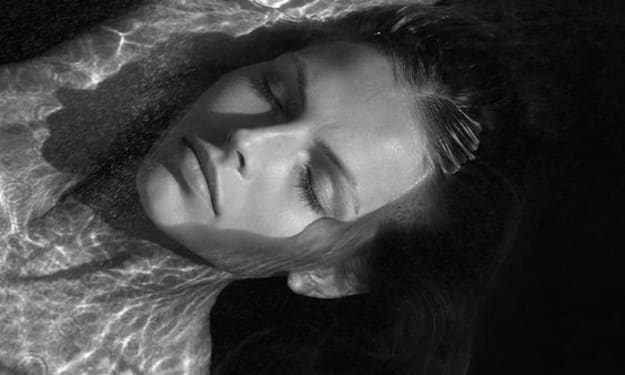
Mental illness runs in my family.
My mum has suffered from Type 1 Bipolar Disorder (the type that comes with full-blown mania and hallucinations) for as long as I can remember. The icing on top of the poop-cake is the fact that I have suicides on both sides of the family, and I myself have been diagnosed with ADHD.
It’s something I have been increasingly open about, and something the producers focused on while I was a contestant for “The Apprentice.” But something I haven’t shared is that I suffered from an episode of visual and auditory hallucinations some months ago.
In this article, I’ll share with you my brief experience with psychosis, and why I choose to, against all odds, see it in a positive light. Let us begin!
The Hallucinations
First, I’ll describe what I saw, then what I heard.
The first time I remember seeing something strange was during the filming of the show. I can’t divulge too much, lest I inadvertently give out spoilers, but it was during an episode when the boss was chewing everyone out. He was sitting in front of a wall, and while he was giving us the hot, hot treatment I saw the wall behind him shift and spin, very much like a whirlpool, as if the wood grains were somehow made out of live liquid.
As is expected for contestants starring in a challenging reality TV show, we were all very stressed and sleep-deprived (two factors that can contribute to psychosis in normally healthy individuals), so I didn’t think too much of it.
I was more concerned when I began hearing things after I getting home. Once again, it wasn’t very scary. This is what happened. After a long night of writing, as is my custom, I sat down to enjoy a good book before turning in. That’s when I began to hear Chopin’s hauntingly beautiful Nocturne No. 20 playing in my head.
“Strange”, I thought. “Did I leave the speakers on?” I went over to my desk to check, and that was when Chopin turned into something no man can play. It sounded like a mix of inhumanely fast piano playing mixed with jazz, a little something like this. That was when my subconscious mind knew I was hearing things — but my rational mind refused to believe it.
“Must be the neighbors,” I rationalized, walking around my living room with one ear cocked to detect where the fast-fae music is coming from. But the music followed me everywhere I went. This is when I knew I was the only one who could hear it.
I was unnerved, but not frightened. Thinking that there was nothing I could do about it, I sat down and resumed reading. Some Bukowski, I believe it was. The otherwordly head-music went away about 20 minutes later. I was initially concerned that I would go down the route my mother took — Bipolar Disorder is highly genetic, and commonly manifests itself at the age of 25.
I am 25.
But so far, after some months and a trip to Kyrgyzstan and back, I have yet to experience anything of the sort again. I eventually chalked it off as the stress of the show and my late-night writings getting to my head.
If you clicked on this article expecting full-blown mania and hallucinations the likes Hunter S. Thompson had after partaking in copious amounts of LSD, I’m sorry. Mine wasn’t so dramatic — most episodes of psychosis don’t seem to be. My friend, for example, after not sleeping for three days to binge-study for an exam, saw a pair of feet under his fridge door. He remained unperturbed and went right to bed.
Though I didn’t go stark raving, my experience with psychosis nevertheless helped me understand folks suffering from mental disorders better, and also gave me a newfound feeling of connection to all the suffering artists of old.
Let me explain.

Newfound Empathy For People Who Suffer From Afflictions Of The Mind
Singapore, where I stay, has just begun to embrace the mental health revolution.
And about time too. Up until a few short years ago, suicide was literally illegal in the little red-dot. If you attempted it and failed, you could be jailed. The way this sentence rhymes is funny, but it’s implications are not.
Unfortunately, we as of now still understand very little about the way our brain works, and as of consequence, have to guesswork around the human mind. The level of quality care for mental health patients around the world thus remains shockingly low, even among first-world countries. And the level of stigma remains high.
I’m a big believer in the phrase “Don’t judge someone until you’ve walked a mile in their shoes”, and I choose to take a positive lesson from my unique experience. Instead of being frightened and not thinking about my experience ever again, I choose to look upon it as a gift.
I now understand, first hand, a small sliver of what people suffering from psychosis through. I now understand, first hand, what my mum went through.
You see things that are there but not there. The world swims. It shifts, it vibrates, it’s alive and utterly meaningless and mad — and you’re the only one who sees it. You fear for your sanity. You fear that if you tell someone, anyone, they’ll think that you’re crazy. I’m fortunate that my years of experience in martial arts gave me a calm disposition, but I can see how people who are of a more nervous nature would’ve freaked.
People who suffer from mental health issues, even serious and potentially incurable ones like schizophrenia, aren’t mad, bad and crazy. Don’t call them that. Being born with genetic code they didn’t want and environmental factors they didn’t ask for made them that way. They are people, just like you and me. Treat them with empathy instead of fear, and the world will be better off for it.
As a matter of fact, some of the most celebrated people in history have, at one point or another, suffered from ailments of the mind. I elaborate more on my next point.

Increased Connectedness To Creative Figures
Vincent Van Gogh, pictured above, is perhaps the perfect representation of the tortured genius.
He suffered from mood swings and hallucinations, produced some of his best work when he was being treated in an asylum, and eventually killed himself (or was killed) with a gunshot wound to the chest.
He’s not alone. Many great artistic and intellectual geniuses also suffered from mental illness. Leonardo Da Vinci, the epitome of the Reinassance Man, likely suffered from ADHD. Ernest Hemingway, perhaps the most well-known American author of all time, was an alcoholic and after suffering multiple head injuries, eventually committed suicide with his shotgun. Beethoven had manic depressive mood swings reminiscent of Bipolar Disorder.
I don’t want to go down the corny road of saying there’s a fine line between madness and genius — but there is. It’s a controversial thing to write about, but there’s been evidence that creativity and intelligence come hand in hand with higher rates of mental illness.
I, for one, however, still choose to believe that happiness is a choice. As much as the chemicals in our brain can influence our moods and the things we see, smell, feel and hear. at the end of the day, it is still up to us to interpret them. If we have the ability to reframe things, if we choose to see problems as challenges and setbacks as opportunities, then life will be a lot more fun — you may even be able to, like the famed artists above, translate your madness into your own particular form of genius.
Don’t take it from me. A Stanford study has shown that Africans and Indians who suffer from schizophrenia are more likely to describe the voices they hear as benign, friendly or playful, as opposed to their American counterparts who often described them as terrifying. This shows that the personal, social and cultural way we view things go a long way towards shaping our minds.
And unnerving as it was to experience that episode of psychosis, I feel heartened that I am not alone in this, that great figures in humanity’s history have suffered from worse things than I have endured, and have triumphed not because of their suffering, but despite it.
Seen in these lenses, I feel grateful to have been afforded that small window into their souls, into their heads, into their feelings. I feel appreciative to be able to relate to not just these great men and women I admire, but to the estimated 10% of every human in the world who suffers from one kind of mental illness or the other, my brothers and sisters all.
In Summary
Maybe I’m grasping at straws. Maybe I’m romanticizing things because I’m terrified of what my psychotic episode means, that I may be developing Bipolar Disorder like my mother before me. But I don’t think so. I don’t have the severe mood swings and disturbances that come with the debilitating disorder.
I believe there is a silver lining in everything. That’s the way I’ve lived throughout my life, and that’s the way I will continue to live. Besides, if in the worst-case scenario I do develop something, I am heartened with the thought that if Hemingway, Bukowski, and numerous pen masters I look up to can overcome their inner demons to create stunning works of art, so then can I.
Mental illness doesn’t define you.
It’s how you choose to define it that counts.






Comments
There are no comments for this story
Be the first to respond and start the conversation.